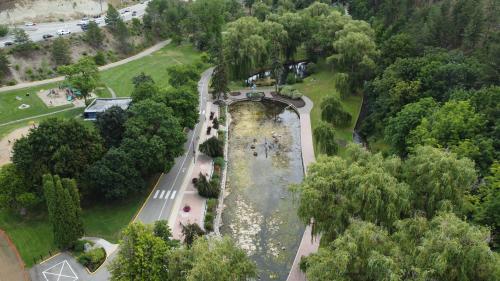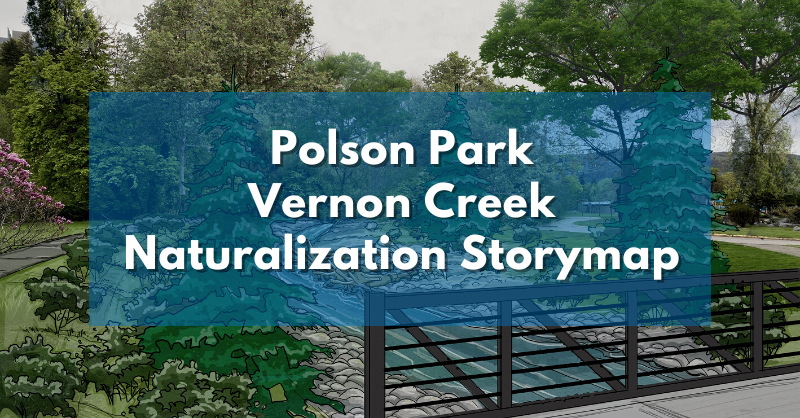The City is working to naturalize Vernon Creek through Polson Park over 2 phases. Construction of Phase 1 was completed in 2024, starting from Highway 97 and going upstream to the outlet of the duck ponds. Phase 2 is underway and will start where Phase 1 left off, continuing upstream towards the existing maintenance vehicle crossing. Naturalizing Vernon Creek through Polson Park is a necessary step to be taken before the City reinvests in new facilities within Polson Park.
Project details:
The naturalization project aims to restore Vernon Creek through Polson Park to a more natural state. This involves replacing the existing concrete banks with a meandering channel that follows its current alignment. By increasing the channel’s length from approximately 700m to 735m, the water will slow, reducing erosion and supporting healthier ecological processes. These changes are essential for preserving spawning materials and improving public safety.
The project will also create space for the creek to naturally overflow into a vegetated floodplain, instead of confining it within concrete walls, where, when the creek spills its banks, it floods the park. This floodplain will help manage larger flood events while supporting the surrounding environment. By removing barriers such as the concrete channel and duck ponds, this project will restore the natural movement of groundwater toward Vernon Creek. This is expected to help alleviate longstanding issues with high groundwater levels and water ponding in Polson Park, such as those that caused the closure of the Polson splash park in 2019 and removal in 2021. The return of cooler groundwater to the creek will also improve water quality and benefit aquatic species that rely on these conditions.
Additional natural features, such as riffle pools and boulders, will be added to enhance fish habitat and spawning areas, which are currently minimal. The project aims to improve water quality, expand fish habitats, increase riparian complexity, and reduce groundwater impacts on park operations. The channel will have shallow slopes, reinforced with natural riparian vegetation and bank armoring to prevent erosion.
The project also includes new infrastructure, such as three new crossings planned over the two phases, a wider gravel pathway on the south side of the creek (along hospital hill), and gravel pathways on the north side.
The City's grant application to the Disaster Risk Reduction - Climate Adaptation Funding Stream by the Community Emergency Preparedness Fund (CEPF) was successful, securing approximately $2.5M for Phase 1 of the project. The City’s grant application for Phase 2 is currently under review by the grant review board.
Polson Park Project Costs and Funding |
|||
| Phase | Phase 1 (2024) | Phase 2 (2025) | Total |
| Estimated Cost | *$3.8M | **$5.16M | $8.96M |
*$2.53M Grant + $1.27 Casino Fund = $3.8M Phase 1 funding source.
**$2.58M CWF Gas Tax + $2.58M Casino Fund = $5.16M.

Phase 1 - drawing package

Phase 2 - drawing package
To help share the vision of this project with the community, an interactive story map has been created to show more details about the project and the reasons why the City is moving forward with this work.
Project Schedule:
Phase 1: Completed 2024
Phase 2: June to November 2025
To minimize disruption to park users and for safety reasons, construction fencing will be installed around the entire perimeter of Phase 2 as shown in the figure below. The construction fencing will remain in place for the duration of the project (June to November 2025). The internal road to the south side of the oval track, including the parking lot next to the oval track along the south side, will be closed off to the public for the duration of construction.

Riparian Plantings
As part of the City's permitting requirements, the riparian plants must meet a minimum of 80% survivability rate for a period not less than 5 years. Until the plants become self-sustaining, supplemental irrigation and maintenance is required. Similar to the BX Sediment Pond project, the construction fencing will be replaced with temporary fencing around the entire perimeter of the phase 1 site. The fencing will remain in place for the first two years following completion of phase 1 (November 2026) to allow the riparian plants to become established. The fencing is there to protect the sensitive riparian plants from animal damage, vandalism or other. Following the first two years, the City will evaluate if the fencing is necessary to remain in place to allow the plants more time to mature or if the fencing can be removed.
Frequently Asked Questions
Are the supporting studies available for public review?
Yes. This project is based on recommendations from a hydrogeology study completed in 2020, available here. The City also completed Flood Mapping, Risk Assessment and Mitigation work. This work supports and complements the Okanagan Nation Alliance work to reintroduce sc’win (sockeye) and ntytyix (chinook) salmon to the region.
What are the expected benefits of this project?
By removing barriers such as the concrete channel and duck ponds, this project will restore the natural movement of groundwater toward Vernon Creek. This is expected to help alleviate longstanding issues with high groundwater levels and water ponding in Polson Park, such as those that caused the closure of the Polson splash park in 2019 and removal in 2021. The return of cooler groundwater to the creek will also improve water quality and benefit aquatic species that rely on these conditions. The project also enhances the creek’s resilience by restoring a natural floodplain. This will allow Vernon Creek to better manage seasonal flows and flooding events, reducing the risk of localized flooding and lowering maintenance costs.
Additionally, the project will reintroduce spawning gravels for native fish species, which have been lost due to previous channelization of the creek. This habitat enhancement will support healthier fish populations and help restore natural ecosystem functions.
Will public walkways be affected?
This project will remove the existing undersized crossings and replace them with 3 new crossings (1 in phase 1, 2 in phase 2). A new gravel multi-use pathway along the southside of the channel (hospital hill side) where there is currently none. New gravel pathways will also be incorporated into the project. A new plan for Polson Park will guide the City’s investment in Polson Park following the completion of Phase 2.
Why are trees being removed as part of this project?
Grading the land and removing trees in and around Vernon Creek is a necessary part of the project to re-establish the flood plain in Polson Park and protect future investment in new amenities within the park. The City understands that removing trees impacts wildlife habitat and how the community experiences the park. Every effort will be made to retain as many trees as possible. Various tree species will replace those being removed, as well as additional natural riparian vegetation. The City is confident that once completed, the project will make Polson Park an even better place to visit in every season.
Is reforestation of the creek area part of the project plan?
Once the meandered creek channel has been restored, replanting the floodplain will commence. The City has an extensive restoration planting plan using native plants to the area which will be implemented after grading is completed. The riparian plants are required to meet a specific survivability rate over a 5 year period to meet permitting requirements. To allow the plants time to become established, fencing will be installed around the perimeter of the project site for the first two years. After which, the City will determine if the fencing can be removed or if the plants need more time to become established.



Mathew Keast, P.Eng
Water Resource Engineer
250 550 3586
mkeast@vernon.ca

